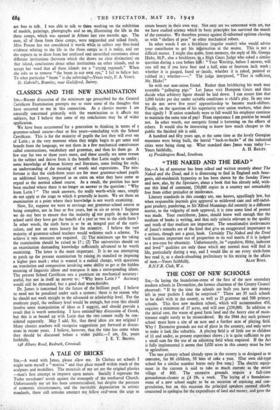MAKRONESOS
Snt,—The Spectator of May 6th reached me belatedly. But, if you will allow me, I -should like to comment on Miss Pascoe's letter. Those of us who have studied the progress of concentration camps, re:educa- tional camps, labour camps and similar institutions during the last fifteen years were at first pestered by those who representM them as not nearly as bad as we made out, though in fact they turned out to be much worse. Today, when we find that in one country at least this progress has taken another direction, and that some of these instiffitions have begun to serve an-emancipatory purpose, we are pestered by the spiritual successors of our old pesterers, who now represent these camps as much worse than we make out.
I spent a day in the three training camps at Makronesos. Miss Pascoe has been to none of them. She-writes about what she calls "detention camps," which she has npt visited either. - She says she asked "the Greek Embassy" for a Visa to visit her, friend, General Sarafis," who has been interned because Greece is at war, and to intern a former Commander of E.L.A.S. is a necessary precaution. The "detention camp" where he is interned has nothing to do with the three training camps which I visited. The Greek Embassy does not, ahd cannot, grant visas to visit military areas and camps, but only general visas to visit Greece. Permits to visit such areas and camps are issued by the competent atithorities in Athens. Miss Pascoe has produced no evidence and refu- tation of my statement that there is no difficulty in visiting Makronesos, and even the:'...)::trespondent of Tess in Athens had none. Miss Pascoe says she had made "every effort to collect information from British and American journalists and others who have visited the island." No "effort '; is necessary. I have compared notes with others—including British and American journalists—who have made the visit, and find them in substantial agreement with myself. If my account is what Miss Pascoe calls "roseate in hue," so is theirs.
Miss Pascoe calls the island "treeless and dusty." The greater part of Attica is -treeless and dusty. She says, "The water supply is uncertain." The water supply is a matter of some uncirtainty in the greater part of Greece. Water arrives at Makronesos regularly in tanks—the supply is made certain. She says the rations are "meagre." I have shared them, and have not found them so. But perhaps my judgement has been cor- rupted by our " austerity?' She says some of the men " apparently " get leave, others."are said to have been refused it." It is evident that she does not know.
The purpose of the training camps is to train Communists and suspected Communists for service with the colours. If they are willing to serve loyally they are asked to sign a declaration of loyalty. If they are unwilling they are interned. What else does Miss Pascoe expect in time of war? To .establish the three camps was a difficult and perilous enterprise—in time of War. It is not surprising .that Communists among the recruits banded together to start a mutiny—according to their con- ception of duty it was, after all, their duty to do so. What treatment does Miss Pascoe expect mutineers to receive in time of war ? But I was, in my article, not concerned with the history of the three camps, but with their present state and with the success achieved by Colonel Baraiktaris after immense difficulties.
What I have said about Miss Pascoe applies also to Mrs. Ambatielos. Her credibility can be assessed by anyone who will refer to her messages in the Daily Worker. She 'was the Athenian correspondent of that journal from 1946 to 1948. These messages are exercises in Communist mythology and are consistent inversions of the maxim, "Facts are sacred, comment is free.'1 •
Miss Pascoe does not seem to have questioned any persons who have been trained in any of the, three camps recently—say, during the last six months. And yet there is no difficulty in meeting many such. Thousands are serving with the regular forces. Many are on leave. Many have been discharged from the forces and are now in civilian employment. All are free to talk. I was able to talk to those working on the exhibition of models, paintings, photographs and so on, illustrating the life in the three camps, which was opened in Athens just two months ago. The men, all of them from these camps, were unguarded and talked freely. Miss Pascoe has not considered it worth while to collect any first-hand evidence relating to the life in the three camps as it is today, and yet she expects us to draw from her confused and unverified statements about different institutions (between which she draws no clear distinction) on that island, conclusions about other institutions on other islands, and to sccept her word that all these islands are a "crying reproach." When she asks us to remove "the beam in our own eye," I fail to follow her. To what particular "beam " is she referring?—Yours truly, F. A. VolGt.
St. Gabriel's, Bramley, near Guildford, Surrey.











































 Previous page
Previous page